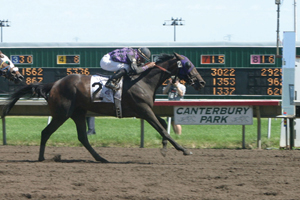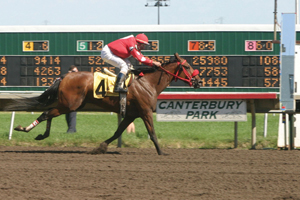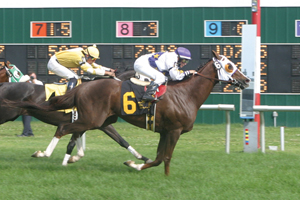by David M. Miller
The fifth running of the Claiming Crown was held at Canterbury Park this season. The event’s return to the site of its origin spurred some questions as to how to best host the “Championship for the Claiming Horse” in the racing seasons ahead.
The Claiming Crown’s sojourn to Philadelphia in 2002 was viewed as a success, but it left more questions about how best to conduct the event than it answered. Total handle on the six-race card saw an 18% reduction from the total handle reported in 2001, the last year the Claiming Crown was hosted by Canterbury Park. Despite a record number of nominations, only 53 runners were entered in the 2002 Claiming Crown. Predictions made that had suggested that the event would flourish on the East Coast due to its close proximity to a number of contributing racetracks did not prove as correct as many expected.
As the 2003 racing season approached, preparations for the Claiming Crown were already being made at Canterbury Park. Meanwhile, claiming outfits around the country had already begun their search for the next season’s Claiming Crown acquisitions. The event’s return to the site of its origin found that it had indeed come of age; the Claiming Crown no longer needed an explanation to attract participants, nor an introduction to racing fans who would wager on the six race series.
The idea that became what is now known as the Claiming Crown was formulated by former Thoroughbred Owners and Breeders Association (TOBA) head Drew Couto, who in turn discussed a joint sponsorship of the event with Bill Walmsley, then president of the National HBPA. Canterbury Park President and General Manager Randy Sampson saw the opportunity the Claiming Crown presented and contacted Couto, suggesting the racetrack in Shakopee, Minnesota would prove an amenable host site after the original plans to conduct the event at the Birmingham Turf Club in Alabama fell through.
Over the course of the Claiming Crown’s first three seasons, the event saw a number of changes. Nevertheless, each running was viewed as an unqualified success. A seventh Claiming Crown race for fillies and mares on the turf was added in the second season but was subsequently discontinued. Perhaps the single biggest rule change affecting the Claiming Crown was the eligibility clause that allowed a runner who had raced for a specified claiming price only once to be eligible for the event, where the original rules called for a runner to have made two starts for a specified claiming price. As a result, the pool of available contestants for the Claiming Crown swelled. Another rule change that proved popular with a number of claiming outfits was the concept of an “open” nomination, wherein a trainer or owner could reserve a Claiming Crown nomination before April 15 for a $250 fee without naming a runner for the event.
A total of 292 horses were nominated to the Claiming Crown in 2003, eight runners shy of the record 300 runners nominated in 2002. That total was not achieved without another concentrated effort from Nat Wess, the director of racing at Canterbury Park, who also assumes the role of Claiming Crown coordinator in the years the event is hosted by Canterbury Park.
Wess’ approach to monitoring horses eligible for the Claiming Crown was rather straightforward and somewhat time consuming. Checking the past performances for eligible runners around the country, Wess identified runners who fit the Claiming Crown conditions and would be competitive in a starter allowance event, then sent the horse’s connections a letter inviting them to enter a nomination.
Pre-entries for the Claiming Crown were taken on July 8, and 87 horses were declared for the six-race card. Nineteen runners were pre-entered in the Iron Horse field, with two runners being awarded automatic starting berths after winning designated Claiming Crown prep races at Lone Star Park and Prairie Meadows.
Canterbury Park hosted a Claiming Crown breakfast on the Wednesday prior to the event that featured Minnesota Vikings coach Mike Tice, a racing fan and regular player at the Minnesota track. Sixty-three starters were drawn for the Claiming Crown card, and while each race featured a full field, only the Iron Horse drew a full gate of 14 runners.
Clear skies and a temperature in the high 70s greeted fans on Saturday, July 19. As a result of a nine-day carryover in the track’s Pick-Six pool, Canterbury Park officials announced a guaranteed pool of $200,000 for the Claiming Crown Pick-Six card. The NTRA co-sponsored an online handicapping contest that awarded an entry into the $200,000 DRF/NTRA Handicapping Championship in Las Vegas that required players select winners from the 11-race card Canterbury Park offered on Claiming Crown day. A season-high 10,420 fans filled the grandstand and apron to watch the day’s races.
The Iron Horse

The $50,000 Claiming Crown Iron Horse was restricted to runners who had once raced for a $5,000 claiming tag in the year prior to Claiming Crown day. In what must have been the strongest $5,000 starter event held in North America this season, the Iron Horse field was reduced to 12 with the late scratches of Wise Talk and Mighty Fine Mike. The remaining field had captured 39 races between them in 2003 alone. By post time, Shut Out Time, a winner of six starts this season, was made the narrow favorite at 3-to-1.
Marshman, a Kentucky shipper who had been claimed four times in 2003 and was exiting two consecutive winning efforts in Louisville, set the pace in the Iron Horse. He was challenged by the favorite in upper stretch. That pair was joined on both sides by several other rivals in the drive, but rallying strongest in the lane was locally stabled Ghoastly Prize, who edged clear late under strong handling from rider Bobby Walker Jr., a jockey who had also spent the summer in Shakopee. Entrepreneurship just edged Shut Out Time late for second place money.
Ghoastly Prize completed the mile and a sixteenth event in 1:44.99 over a fast track. The winner is trained by Tampa-based conditioner Joe Cheeks for owner Steve Richardson. The connections watched the five-year-old gelding win his third race of the meet in as many starts when capturing the Iron Horse. Richardson’s involvement with the Claiming Crown goes back to the inaugural running, when he parlayed an allowance win by his recent claim, Pioneer Spirit, into a winning nomination in the 1999 Claiming Crown Express. The winning connections earned $27,500 for the victory.
The Express

Restricted to runners who had raced for a $7,500 claiming price in the previous year, the $50,000 Claiming Crown Express field featured ten runners, but the wagering public could not look past Pelican Beach and sent the Scott Lake trainee postward at 7-to-10 odds. A rapid pace was set by Ten Pound Test, who cut out the first quarter in :21.4. He was quickly joined by Maryland shipper Landler and Pelican Beach on the turn, and the trio streaked by the quarter pole in :43.4. Track announcer Paul Allen was left in an unenviable position when he announced that it appeared Pelican Beach would win the contest after he opened a three length margin in midstretch, only to watch the favorite drift in late and lose his advantage on the wire to Landler, who made a pronounced second effort to prevail. The pair completed the six furlongs in 1:09.65. Spooky Mulder rallied for third money, another three and a half lengths behind the top pair.
Landler was ridden by Ryan Fogelsonger. The winner was claimed from breeder Gustav Schickedanz at Laurel for $7,500 in January by trainer Gary Capuano for the Hampshire Racing Partnership. Landler, a four year old gelding, won his sixth career start and earned $27,500 for his victory in the Express.
The Glass Slipper

Nine fillies and mares comprised the field for the $75,000 Glass Slipper, a race restricted to female runners who had raced for a claiming tag of $12,500 in the previous year. TVG analyst Matt Carothers was on hand with fellow racing analyst Todd Schrupp to cover the Claiming Crown for the network, and he selected Margarita’s Garden as the favorite with the strongest chance to prevail in the Claiming Crown’s Pick Six sequence. For six furlongs, it appeared Carothers was correct as the 8-to-5 favorite Margarita’s Garden put away several pace challengers while setting fractions of :21.2 and :43.2 and holding a clear advantage in upper stretch.
Making solid progress just off the rail and bidding inside the favorite late was Mum’s Gold, who took command in the last sixteenth and prevailed by a length and a half. Margarita’s Garden finished second, clear of Sentimentalromance by a similar margin. Mum’s Gold completed the six and a half furlongs in 1:16.82 under rider Nick Santagata.
Trainer Chris Landicini Jr. had claimed Mum’s Gold for $12,500 at Philadelphia Park in March and had watched his charge reel off four straight wins before her victory in the Glass Slipper. The winner was greeted by the enthusiastic members of the Sweet Heart Stable, a partnership that was formed at a Saturday afternoon party after several members had discussed the desire to own a Thoroughbred. Mum’s Gold earned $41,500 for the group with her victory in the Glass Slipper.
The Rapid Transit

Four locally stabled runners and three other shippers met a formidable trio in the $100,000 Rapid Transit, a race restricted to runners who had competed for a $16,000 tag in the previous year. Favored Debonair Joe had captured the Malibu Stakes (Gr. I) last December, and co-second wagering choices Bensalem and Pioneer Boy had won ten races between them in 2003 alone.
Bensalem made the pace, setting fractions of :21.3 and :43.4 while tracked intently by Pioneer Boy. Under rider Rick Wilson, Pioneer Boy wrested command leaving the turn and drew clear. Rider Julie Krone had Debonair Joe in full gear racing into the lane but could not collar Pioneer Boy, who prevailed by two and a quarter lengths and completed the six and a half furlongs in 1:15.47. Bensalem finished third, four lengths behind Debonair Joe.
Pioneer Boy was claimed for owner Mike Gill by trainer John J. Robb for $30,000 in February at Laurel Park. A winner of the Maryland Breeders Cup Handicap on Preakness Day, Pioneer Boy banked another $55,000 for his connections with the win in the Rapid Transit.
The Emerald

The lone grass race of the Claiming Crown card was restricted to runners who had competed for $20,000 or less in the previous year. The $125,000 Emerald field was reduced to ten after the late declarations of Playing It Cool and North of Six. Owner Richard Englander was represented by the Jeff Mullins trainee Mega Gift, who was sent postward as the 3-to-2 favorite.
Ginontherocks and Unpeteable set the pace into the backstretch, carving out fractions of :23 and :46 seconds. They were soon joined by the favorite and Banner Boy, while second wagering choice Image steadily drew closer to those rivals leaving the far turn. Under rider Julie Krone, Image took over in midstretch and held safe a late challenge from Fairmont shipper W W Robin De Hood to prevail by three parts of a length. Mega Gift held well to finish third, another length behind the top pair. Image completed the mile and sixteenth in 1:42.12 over firm going.
Image’s win in the Claiming Crown was something of a homecoming for his breeders, Joe and Carolyn Friedberg, who raced Image’s dam, Shared Reflections, at Canterbury Downs in the 1980s. The Friedbergs sold Image as a yearling to Claiborne Farm for $300,000. A full brother to the Friedberg’s Locust Grove winner Shires Ende, Image had fallen through the claiming ranks and was claimed by trainer Steve Asmussen when the gelding was dropped in for a $17,500 claiming tag at Fair Grounds Racecourse in December. A subsequent winner of two starts for Robert Asaro, Image’s win in the Emerald garnered his connections $68,750.
The Jewel

Eight runners contested the $150,000 Jewel, a race restricted to horses that had raced for $25,000 or less in the previous year. The wagering public concentrated its attention on the three runners that had proven themselves in stakes company in recent months.
Patton’s Victory came into the Jewel with an impressive string of performances, having won six of his last eight starts. The first of that skein had come in an open $7,500 claiming contest at Hoosier Park in October. The Stanley Roberts trainee had solidified his form in recent months, winning the Fifth Season Breeders’ Cup Stakes (Gr. III) at Oaklawn and winning the Precisionist Stakes at Prairie Meadows in May.
Trainer Deborah Simpson shipped Freeze Alert, a winner of the Bayard Tuckerman Stakes at Suffolk in May, to compete in the Jewel. A winner of 11of his last 19 races, Freeze Alert had earned over $160,000 in two seasons of racing.
Daunting was made the 7-to-5 favorite for his sharp form in optional claiming company in Southern California. A five-year-old gelding, Daunting had finished a close fourth in the Native Diver (Gr. III) in December after forcing the pace.
Patton’s Victory had the best early speed and cut out easy fractions of :23.1 and :46.3 racing into the backstretch. Rider Julie Krone had made a deft move on the first turn to cut inside foes and gain terms with the pacesetter while rationing Daunting’s pace. Under firm urging, Daunting challenged the pacesetter midway through the far turn and steadily edged away in the stretch to capture the Jewel by 3-1/4 lengths.
Freeze Alert made solid progress to finish second, another two lengths in front of Patton’s Victory. Daunting completed the nine-furlong Jewel in 1:49.17.
Mark Glatt trains the winner for the Plan B Stable and claimed Daunting for $16,000 at Santa Anita in March. The Plan B Stable is operated by Lanear Bannasch, who was on hand to witness the Jewel and dedicated Daunting’s victory to the memory of her late husband, Bill. Daunting earned $82,500 for his win in the Jewel.
Home of the Claiming Crown?
During the week leading up to this year’s Claiming Crown, it was suggested that the original plan calling on Canterbury Park to host the event in alternate years might be modified to make Canterbury Park the permanent host site.
Perhaps the best case for that proposal could be found in Claiming Crown V’s handle numbers. In 2003, $2,566,412 was wagered on the Claiming Crown races through on-track and simulcasting venues. Canterbury reported a total handle of $3,241,926 for the 11-race card, with $778,062 wagered on-track. That marked difference in on-track handle from the numbers reported by Philadelphia Park reflects how important a fixture the Claiming Crown has become to the live fan base of Canterbury Park.
Canterbury’s treatment of the owners, horsemen and staff while hosting the Claiming Crown has drawn compliments from a number of participants. Scott Lake, an annual visitor to the track located 20 minutes West of the Minneapolis-St. Paul airport, commented, “Everybody that’s involved in this really treats you well and goes out of their way to bend over backwards for you … And the track surface here – I was just talking to one of my owners a little while ago that the track surface here is probably the best surface I’ve trained over anywhere.”
Owner Richard Englander has won three Claiming Crown races at Canterbury Park and shared Lake’s enthusiasm, “It’s just something about it. I mean, Canterbury does a phenomenal job. It’s just like it’s horse racing at its best … It’s got a little bit for everybody … And there’s just something about it that I look forward to it every year.”
Canterbury Park’s location was perceived to be a drawback for horsemen who shipped their charges to the Shakopee racetrack for the inaugural Claiming Crown, but three successive renewals have streamlined the process. Shipping a racehorse to Canterbury Park for the Claiming Crown was reduced to a plane load each from the East Coast and California and van rides from Kentucky and Chicago. The 2003 Claiming Crown winners last raced at Colonial Downs, Philadelphia Park, Monmouth Park, Arlington Park, Hollywood Park and Canterbury Park, demonstrating that a Claiming Crown winner can ship from anywhere and win.
One number Canterbury Park has not released is how much of the cost of hosting the Claiming Crown is assumed by the racetrack, as it is generally understood that the Claiming Crown has yet to prove a profitable venture for any host site. Track President and General Manager Randy Sampson has indicated that in the years that followed the inaugural Claiming Crown, the track has steadily closed the gap on expenses produced by the Claiming Crown to the point that suggests the event can be funded by its own revenues in the years ahead. As the Minnesota HBPA has also sacrificed some share of its purse structure to make the Claiming Crown a reality, the possibility of making the event a permanent, self-funding fixture appears an attractive option.
While the 2004 host site is being determined, owners and horsemen are already making plans to find next year’s Claiming Crown winners. Englander shared his thoughts about the process, “As far as the progress, I think the progress has hurt somebody like me that’s … We have everything computerized, and we’re doing our due diligence to get horses – to claim horses for the Claiming Crown and to get horses eligible for the Claiming Crown. And I think that there’s a lot more awareness about the Claiming Crown now. I think Nat Wess might have done too good a job. So there’s a lot more competition right now.”
© 2003 The Horsemen’s Journal
